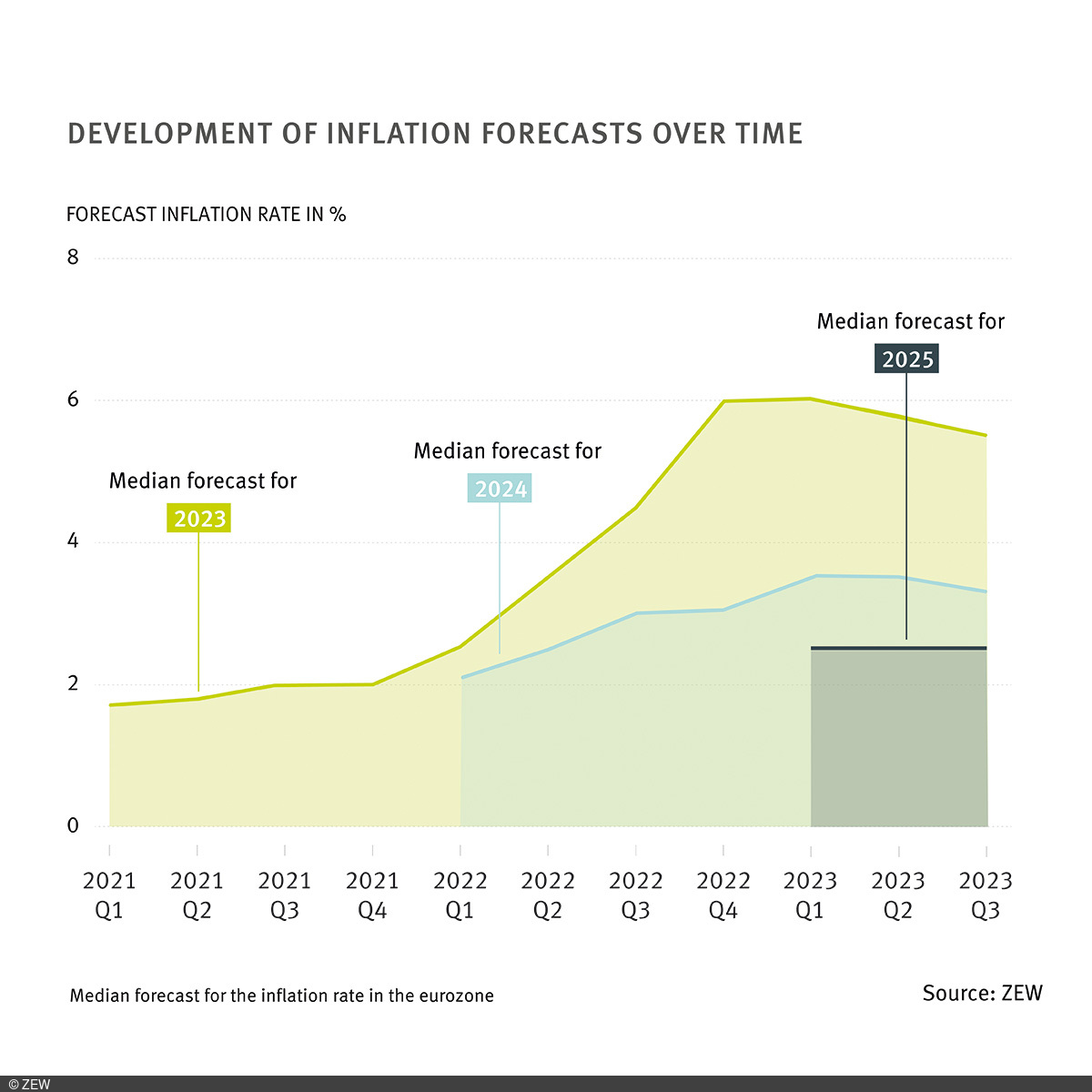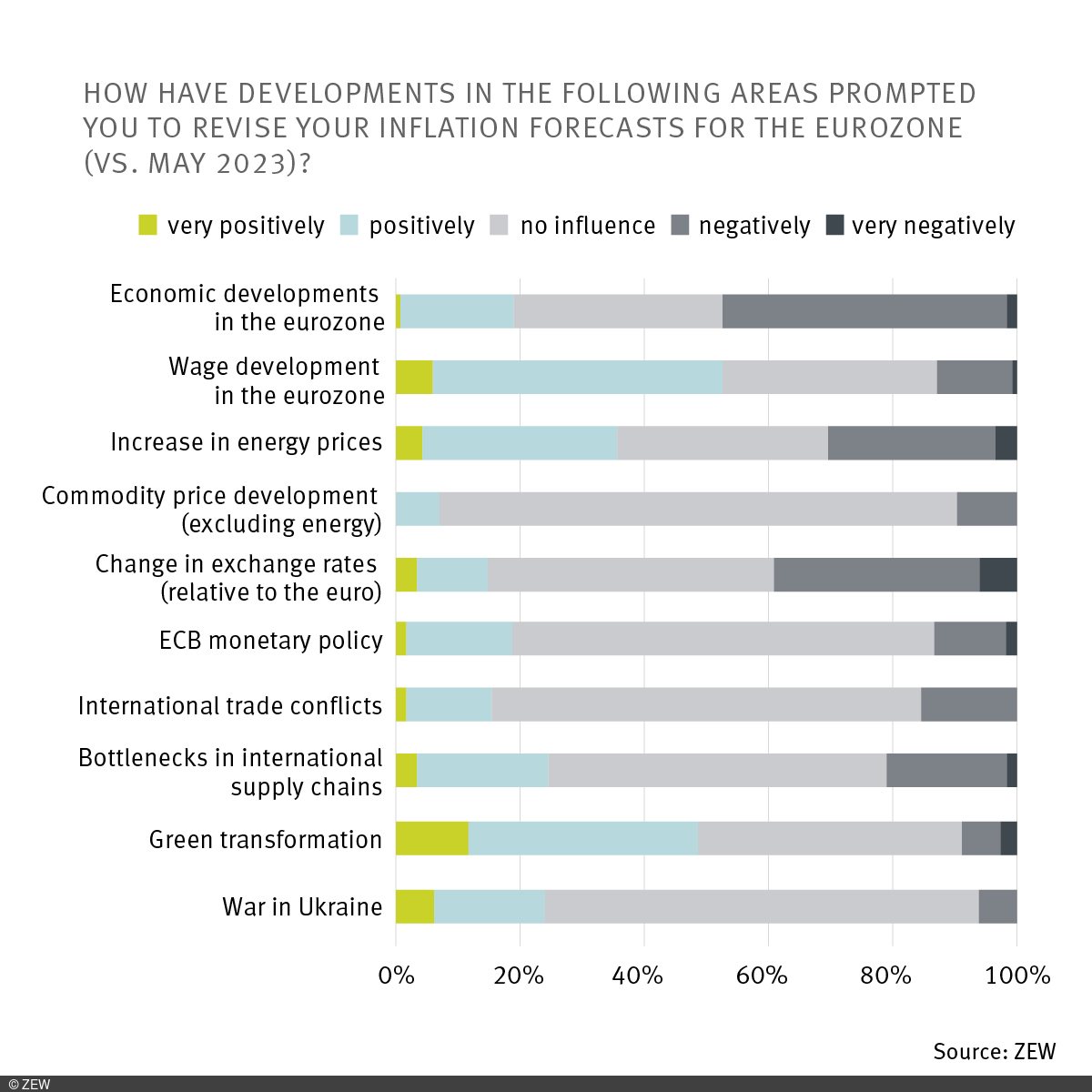Eurozone Inflation Projections Recede
ResearchSpecial Question in the ZEW Financial Market Survey from August 2023
The eurozone inflation projections of the financial market experts surveyed by ZEW Mannheim are noticeably receding for the first time in a while. Forecasts point to a gradual decrease in inflation over the upcoming years. However, the European Central Bank’s (ECB) inflation target is unlikely to be achieved until at least 2026. While many respondents continue to view wage trends in the eurozone with concern, the economic development is increasingly fostering expectations of declining inflation. For the year 2023, the experts do not anticipate any further significant interest rate hikes by the ECB. In 2024 and 2025, ECB interest rates are expected to fall gradually. These are the results of the key question included in the ZEW Financial Market Survey in August 2023, in which the respondents provided their predictions of how inflation and key interest rates will develop in the eurozone from 2023 to 2025.
“Following May 2023, which marked the first time financial market experts didn’t anticipate inflation to climb any further, we now observe a distinct decline in August 2023. While inflation expectations remain at a high level, suggesting that inflation rates are likely to remain well above the ECB’s 2 per cent target until 2025, the past two surveys indicate a turning point,” comments Dr. Frank Brückbauer, a researcher in the ZEW’s “Pensions and Sustainable Financial Markets” Unit. “Wage developments in the eurozone continue to be a significant driver of inflation. At the same time, the economic situation in the eurozone is somewhat dampening inflationary pressures.”
Inflation expectations noticeably receding
In the August 2023 survey, financial market experts predict median inflation rates of 5.5, 3.3 and 2.5 per cent for 2023, 2024 and 2025, respectively. The majority therefore maintains the view that the ECB won’t attain its two per cent inflation target during the 2023–2025 period. Nonetheless, inflation projections are now notably receding for the first time in a while. In May 2023, the median projections for the years 2023, 2024, and 2025 were 5.8, 3.7 and 2.5 per cent, respectively.
Wages continue to drive inflation, economic situation has curbing effect
Continuing from the May 2023 survey, wages remain the primary drivers of inflation. A majority of 53 per cent of financial market experts say they have raised their inflation forecasts based on the development of wages since May 2023. However, this sentiment is a slight decline from the previous survey, where approximately 70 per cent shared the same view. Concurrently, respondents suggest that the economic situation is playing a moderating role in inflation expectations. Around 47 per cent report that they have lowered their inflation forecasts due to the economic situation.
About the survey
The ZEW Financial Market Survey has been conducted since December 1991. Participants are asked monthly about their expectations concerning the development of major international economies, including Germany, the eurozone, the United States and China. In total, the panel consists of about 350 financial analysts from banks, insurance companies and selected corporations, specifically from the finance, research and economics departments as well as the investment and securities departments. Most of the participants are from Germany.
The financial experts are asked about their expectations on a six-month horizon regarding the development of the economy, the inflation rate, short- and long-term interest rates, equity prices and exchange rates. In addition, they are asked to assess the earnings situation in 13 German sectors. Besides a fixed survey section, special questions on current topics are included on a regular basis. The ZEW Indicator of Economic Sentiment, which has established itself as an early indicator of economic development (“ZEW Index”), is calculated from the expectations of financial market experts on the development of the economic situation in Germany. The results are published and analysed in detail in the monthly ZEW Financial Market Report.


